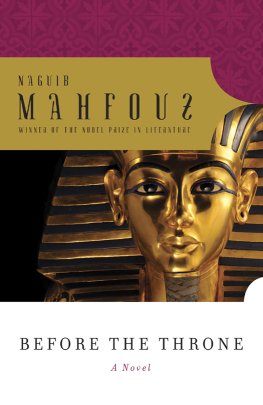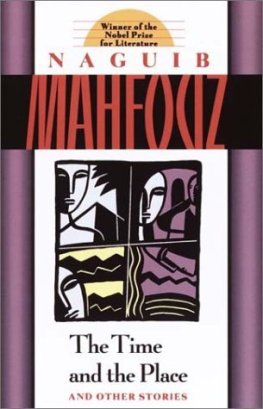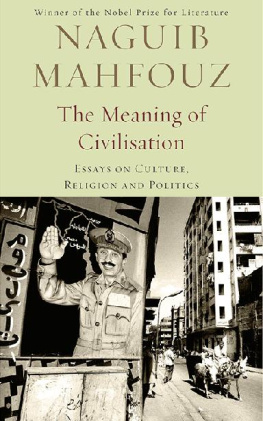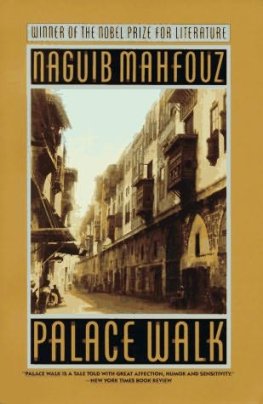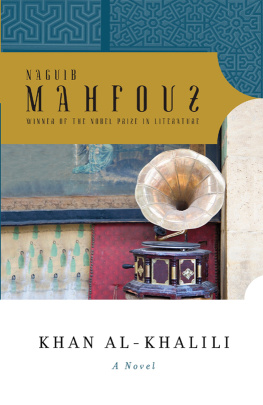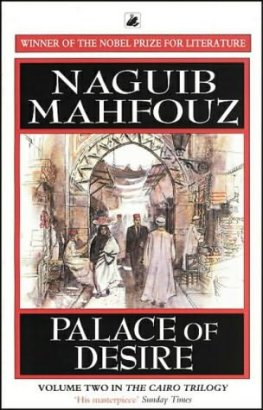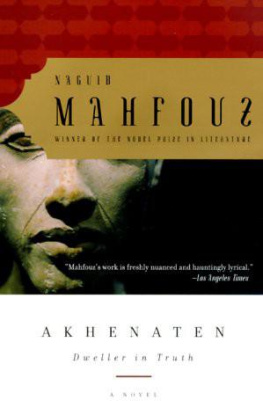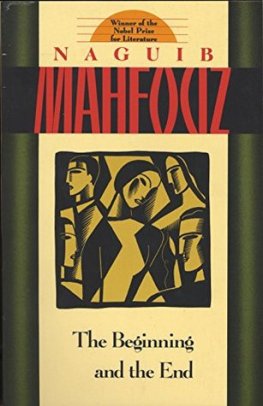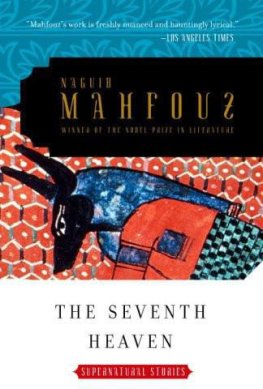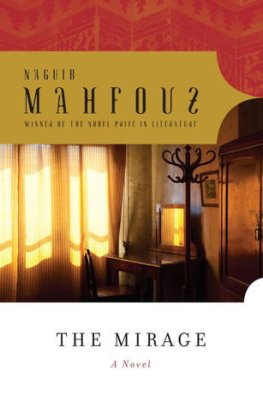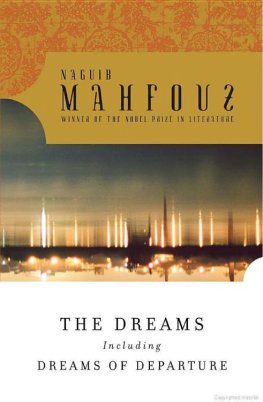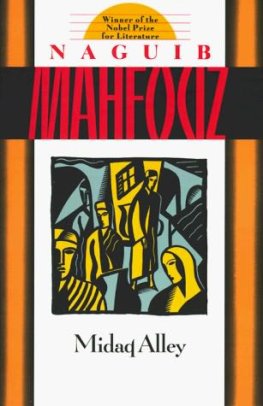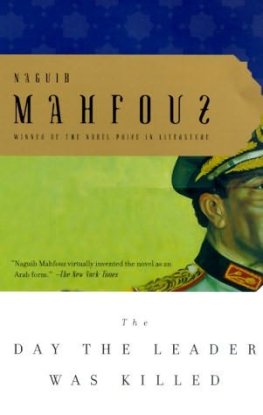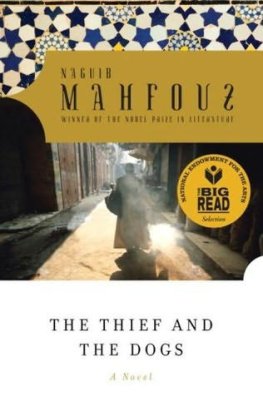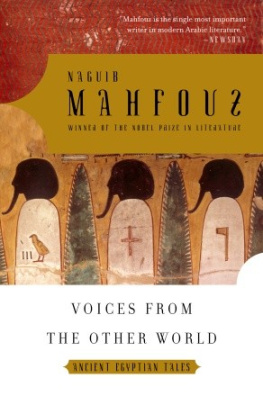Naguib Mahfouz - Before the Throne
Here you can read online Naguib Mahfouz - Before the Throne full text of the book (entire story) in english for free. Download pdf and epub, get meaning, cover and reviews about this ebook. year: 2012, publisher: Anchor, genre: Prose. Description of the work, (preface) as well as reviews are available. Best literature library LitArk.com created for fans of good reading and offers a wide selection of genres:
Romance novel
Science fiction
Adventure
Detective
Science
History
Home and family
Prose
Art
Politics
Computer
Non-fiction
Religion
Business
Children
Humor
Choose a favorite category and find really read worthwhile books. Enjoy immersion in the world of imagination, feel the emotions of the characters or learn something new for yourself, make an fascinating discovery.
- Book:Before the Throne
- Author:
- Publisher:Anchor
- Genre:
- Year:2012
- Rating:4 / 5
- Favourites:Add to favourites
- Your mark:
- 80
- 1
- 2
- 3
- 4
- 5
Before the Throne: summary, description and annotation
We offer to read an annotation, description, summary or preface (depends on what the author of the book "Before the Throne" wrote himself). If you haven't found the necessary information about the book — write in the comments, we will try to find it.
Before the Throne — read online for free the complete book (whole text) full work
Below is the text of the book, divided by pages. System saving the place of the last page read, allows you to conveniently read the book "Before the Throne" online for free, without having to search again every time where you left off. Put a bookmark, and you can go to the page where you finished reading at any time.
Font size:
Interval:
Bookmark:
Naguib Mahfouz
Before the Throne
About the Author
Naguib Mahfouz was one of the most prominent writers of Arabic fiction in the twentieth century. He was born in 1911 in Cairo and began writing at the age of seventeen. His first novel was published in 1939. Throughout his career, he wrote nearly forty novel-length works and hundreds of short stories. In 1988 Mahfouz was awarded the Nobel Prize in Literature. He died in 2006.
About the Translator
Raymond Stock, former Visiting Assistant Professor of Arabic and Middle East Studies at Drew University, is writing a biography of Naguib Mahfouz. He is the translator of numerous works by Mahfouz, including Voices from the Other World, Khufus Wisdom, The Seventh Heaven, The Dreams (which includes Dreams of Departure) and The Coffeehouse.
1
THE COURT GATHERED in its divine entirety within the Hall of Justice, whose high walls were adorned with writing in the sacred hieroglyphic script, under a gilded ceiling in whose heavens gleamed the dreams of all humankind. In the center of the hall Osiris reposed on his golden throne; to his right was Isis, and to his left Horus, each seated on their own thrones. Not far from Osiriss feet squatted Thoth, Scribe of the Gods, the Book of All laid open across his thighs. Meanwhile, chairs plated with pure gold were arrayed on both sides of the hall, ready to receive those whose ultimate fates now would be written.
To commence the proceedings, Osiris declaimed, From the remotest past, it has been decreed that humans shall spend their lives on earth. All the while, there would go with them, even over the threshold of death like a shadow that clings to them a record of all their acts and desires, embodied on their naked forms. Finally, there would be held a detailed dialog that would end with a decisive word. This, then, is that trial, convened after the passage of the allotted span of time.
Osiris then signaled to Horus, and the youth called out with a booming voice, King Menes!
From the door at the farthest end of the hall, a man entered, attired in his burial shroud, though his head and feet were bare. With clear features and a powerful form, he drew closer and closer to Osiriss throne, until he stood three arms lengths from it, in a stance of stark humility.
At this, Osiris beckoned to the divine scribe Thoth, who began to read from the book before him, The mightiest monarch of the First Dynasty, he warred on the Libyans until he subdued them. He attacked Lower Egypt, joining it to southern Egypt, declaring himself king of all Egypt together, crowning himself with the Double Crown. He altered the course of the Nile, establishing the city of Memphis on the new land this formed.
Addressing Menes, Osiris demanded, Tell us what you have to say.
Thoth, your sacred scribbler, has condensed my life in words, Menes replied. How easy is the telling, and how hard was the doing!
We have our own view of how to appraise rulers and their deeds, Osiris warned him. Do not waste time by praising yourself.
I inherited rule of the southern kingdom from my family, Menes said. With it I inherited a mighty dream which all of our early men and women shared to cleanse the country of foreign intruders, and establish an eternal unity whose two wings would be the lands of southern and northern Egypt.
The voice of my paternal aunt, Awuz, was the prime moving force that ignited this awesome dream. She would gaze at me with concern and say, Will you spend your whole life eating, drinking, and hunting? Or she would goad me by adding, Osiris did not teach us farming merely to give us a chance to fight among ourselves over the water needed to irrigate a feddan.
Once I said to my beloved spouse that I could feel a firebrand in my breast that would not cool until I had realized this dream. She was a splendid royal wife when she answered me with passion, Dont let the Libyans threaten your capital and dont allow the people to divide up the land that the Nile has made one.
So I threw myself with vigor into training our strong men for battle, praying to the gods to endow me with the satisfaction of victory, until at my hand the vision of which my pioneering parents and grandparents had dreamed was fulfilled.
You reaped one hundred thousand of the Libyans lives, Osiris reproached him.
They were the aggressors, My Lord, said Menes in his own defense.
And of the Egyptians, northerners and southerners combined, two hundred thousand fell as well, Osiris reminded him.
They sacrificed themselves for the sake of our nations unity, said Menes. Then security and peace reigned over all, while the blood that had regularly been shed in periodic fighting ceased to flow into the waters of the Nile.
Could you not win the people over with words before resorting to the sword? asked Osiris.
I tried that with my neighbors, and brought some of them to us without going to war, Menes answered. But afterward, the sword achieved in a few years what words had failed to do in generations.
Many say such things merely to conceal their belief in force, said Osiris.
The glory and security of Egypt took possession of my emotions, objected Menes.
Your personal glory too, the presiding divinity rejoined.
I do not deny that, Menes conceded, but well-being was general throughout the country.
Wherein your own dynasty and supporters benefited the most and the peasants the least, continued Osiris.
I spent most of my reign in combat and construction, Menes replied. I never luxuriated in the life of the palace, nor savored the taste of fine food or drink, nor cavorted with women other than my own wife while I was obliged to reward my helpers as befitted their labors.
Isis asked leave to speak.
My Lord, she said, you are judging a human, not a god. According to this man, he forsook ease and indolence to purge the land of invaders. He unified Egypt, freed her hidden powers, and uncovered her buried blessings. At the same time, he provided the peasants with peace and security. He is a son of which to be proud.
Osiris was silent briefly, then called out, O King, take the first seat at the right side of the throne as your own.
Menes proceeded to his chair, knowing he was one of the privileged few who may dwell in the Other World.
2
HORUS HAILED THE COURT, King Djoser and his vizier, Imhotep!
From the most distant door to the hall two men, both wrapped in their winding sheets, heads and feet bare, strode briskly forward, one behind the other. The one in the lead was of medium height and solidly built. The one following was shorter and very thin. They walked until they both stood before Osiris, who spoke first to Imhotep.
Step forward, next to the king, he said. In this court, there is no difference between a monarch and his flock.
Imhotep carried out this command, and Thoth read out, King Djoser, founder of the Third Dynasty. He invaded Nubia, discovered the copper mines in the Eastern Desert, and built the Step Pyramid.
And Vizier Imhotep. A sage whose wisdom was passed on for generations. He mastered medicine, astronomy, magic, and architecture: people revered his memory for centuries after his death.
Osiris called on Djoser to speak.
A unified kingdom vast of expanse, plentiful in resources, and dwelling in peace was given to me at birth. Yet those surrounding it had ambitions toward it. So I initiated a policy followed by those who came after me that the defense of Egypt rests on smiting those who strike her from beyond her borders. The country from which most of this infiltration into my country occurred was Nubia. As a result, I decided to expand our southern borders by invading Nubias north, where I established a temple to the God. By virtue of his science and sorcery, Imhotep was aware of the hidden riches in the Eastern Desert. I dispatched expeditions to explore the belly of the earth, where we were rewarded by the discovery of immense veins of copper, a material greatly useful in both war and peace. As the nations welfare rose, I erected the Step Pyramid. At the same time, I encouraged the sciences by awarding gifts to those who excelled in them. The days of my reign brought to Egypt both strength and progress.
Font size:
Interval:
Bookmark:
Similar books «Before the Throne»
Look at similar books to Before the Throne. We have selected literature similar in name and meaning in the hope of providing readers with more options to find new, interesting, not yet read works.
Discussion, reviews of the book Before the Throne and just readers' own opinions. Leave your comments, write what you think about the work, its meaning or the main characters. Specify what exactly you liked and what you didn't like, and why you think so.

